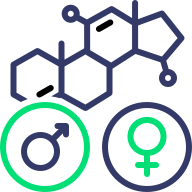Bone Health & Osteoporosis
Bone strength is very important for quality of life as you age for both men and women, with risk of bone loss increasing post-menopause.
Often called a ‘silent disease’, there may be no symptoms of declining bone health. Knowing your current level of bone loss is important to personalise your approach to maintaining healthy, strong bones. Diet and supplements can play a major role in halting or even reversing osteoporosis.
Key Facts
- Calcium is not the only nutrient important for bones. Optimising your levels of several minerals such as magnesium, zinc, boron and levels of vitamin D and K2 can support calcium in bones
- Some dietary and lifestyle factors, including ongoing inflammation and stress can increase bone loss and it may be important to address these
- Exercise is key in maintaining bone density.
- After the menopause, women lack oestrogen which helped to keep their bones strong. Phytoestrogens in the diet or supplements may be used to support bone health
- A DEXA scan is the gold standard test to measure your bone density. However, a bone turnover test can assess markers of current levels of bone loss between DEXA scans, allowing ongoing assessment and management
Best Test Options
Patient Story
History
Deirdre attended our clinic after a DEXA scan identified osteopenia. She had been advised to take calcium but wanted to know what else she could do with her diet and lifestyle to slow down bone loss and progression to osteoporosis.
Tests
Deirdre carried out a bone turnover test to assess her current rate of bone loss, which was elevated for her age.
She also did a Functional Nutritional Profile blood test to check her levels of minerals to support healthy bones. She had low levels of zinc and magnesium and low vitamin D, all important for bone health.
Plan
Deirdre made excellent changes to her diet to support her intake of calcium and other minerals. She was also given a more comprehensive supplement protocol to restore deficiencies and support optimum calcium balance. Deirdre incorporated more effective movement into her day, including resistance exercises to support bone strength.
Repeat test
Deirdre’s repeat bone turnover test showed a marked improvement in her rate of bone loss.
Outcome
Deirdre continued to attend our clinic in relation to managing her bone health and supplement plan. Her next DEXA scan would be in 5 years.
“I’m delighted with the results, it’s great to know that what I’m doing is working!”




